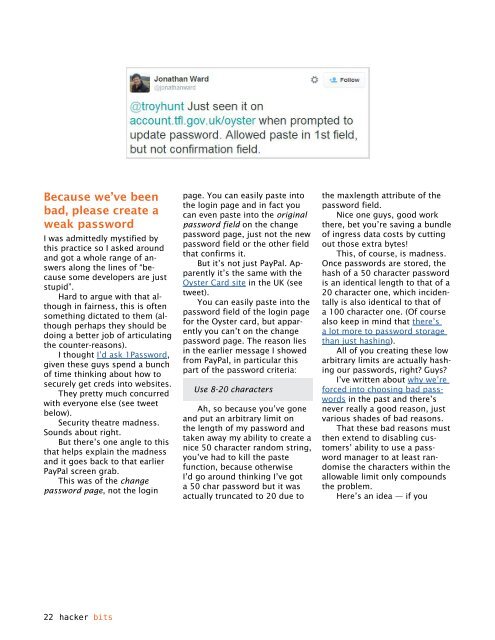Hacker Bits, August 2016
HACKER BITS is the monthly magazine that gives you the hottest technology stories crowdsourced by the readers of Hacker News. We select from the top voted stories and publish them in an easy-to-read magazine format. Get HACKER BITS delivered to your inbox every month! For more, visit https://hackerbits.com/2016-08.
HACKER BITS is the monthly magazine that gives you the hottest technology stories crowdsourced by the readers of Hacker News. We select from the top voted stories and publish them in an easy-to-read magazine format.
Get HACKER BITS delivered to your inbox every month! For more, visit https://hackerbits.com/2016-08.
Create successful ePaper yourself
Turn your PDF publications into a flip-book with our unique Google optimized e-Paper software.
Because we’ve been<br />
bad, please create a<br />
weak password<br />
I was admittedly mystified by<br />
this practice so I asked around<br />
and got a whole range of answers<br />
along the lines of “because<br />
some developers are just<br />
stupid”.<br />
Hard to argue with that although<br />
in fairness, this is often<br />
something dictated to them (although<br />
perhaps they should be<br />
doing a better job of articulating<br />
the counter-reasons).<br />
I thought I’d ask 1Password,<br />
given these guys spend a bunch<br />
of time thinking about how to<br />
securely get creds into websites.<br />
They pretty much concurred<br />
with everyone else (see tweet<br />
below).<br />
Security theatre madness.<br />
Sounds about right.<br />
But there’s one angle to this<br />
that helps explain the madness<br />
and it goes back to that earlier<br />
PayPal screen grab.<br />
This was of the change<br />
password page, not the login<br />
page. You can easily paste into<br />
the login page and in fact you<br />
can even paste into the original<br />
password field on the change<br />
password page, just not the new<br />
password field or the other field<br />
that confirms it.<br />
But it’s not just PayPal. Apparently<br />
it’s the same with the<br />
Oyster Card site in the UK (see<br />
tweet).<br />
You can easily paste into the<br />
password field of the login page<br />
for the Oyster card, but apparently<br />
you can’t on the change<br />
password page. The reason lies<br />
in the earlier message I showed<br />
from PayPal, in particular this<br />
part of the password criteria:<br />
Use 8-20 characters<br />
Ah, so because you’ve gone<br />
and put an arbitrary limit on<br />
the length of my password and<br />
taken away my ability to create a<br />
nice 50 character random string,<br />
you’ve had to kill the paste<br />
function, because otherwise<br />
I’d go around thinking I’ve got<br />
a 50 char password but it was<br />
actually truncated to 20 due to<br />
the maxlength attribute of the<br />
password field.<br />
Nice one guys, good work<br />
there, bet you’re saving a bundle<br />
of ingress data costs by cutting<br />
out those extra bytes!<br />
This, of course, is madness.<br />
Once passwords are stored, the<br />
hash of a 50 character password<br />
is an identical length to that of a<br />
20 character one, which incidentally<br />
is also identical to that of<br />
a 100 character one. (Of course<br />
also keep in mind that there’s<br />
a lot more to password storage<br />
than just hashing).<br />
All of you creating these low<br />
arbitrary limits are actually hashing<br />
our passwords, right? Guys?<br />
I’ve written about why we’re<br />
forced into choosing bad passwords<br />
in the past and there’s<br />
never really a good reason, just<br />
various shades of bad reasons.<br />
That these bad reasons must<br />
then extend to disabling customers’<br />
ability to use a password<br />
manager to at least randomise<br />
the characters within the<br />
allowable limit only compounds<br />
the problem.<br />
Here’s an idea — if you<br />
22 hacker bits















